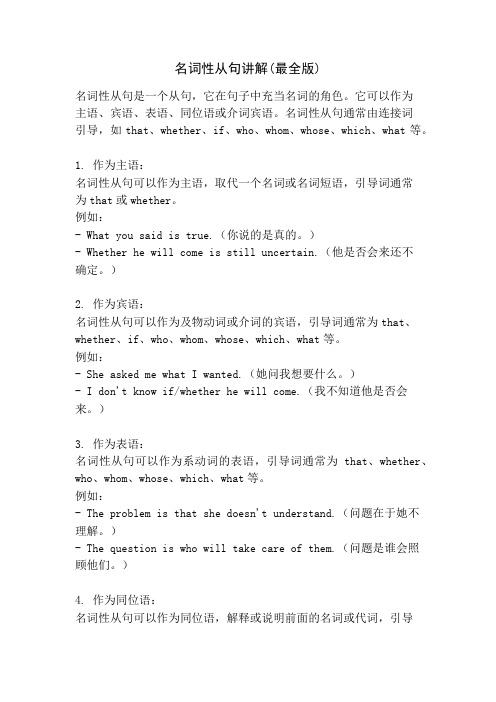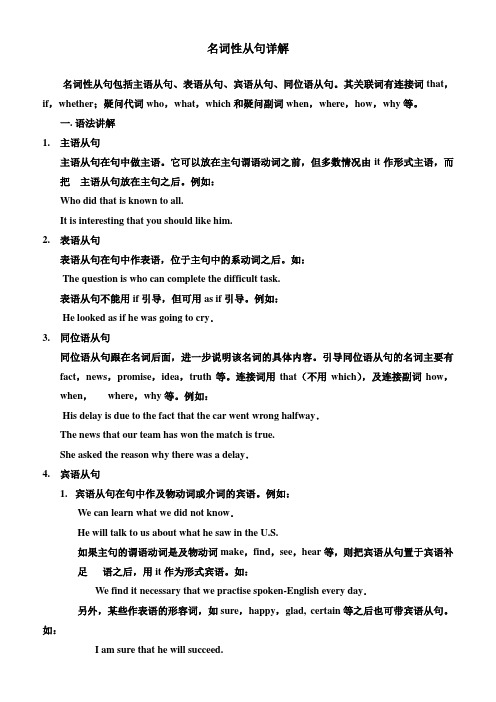名词性从句讲解
名词性从句讲解(最全版)

名词性从句讲解(最全版)名词性从句是一个从句,它在句子中充当名词的角色。
它可以作为主语、宾语、表语、同位语或介词宾语。
名词性从句通常由连接词引导,如that、whether、if、who、whom、whose、which、what等。
1. 作为主语:名词性从句可以作为主语,取代一个名词或名词短语,引导词通常为that或whether。
例如:- What you said is true.(你说的是真的。
)- Whether he will come is still uncertain.(他是否会来还不确定。
)2. 作为宾语:名词性从句可以作为及物动词或介词的宾语,引导词通常为that、whether、if、who、whom、whose、which、what等。
例如:- She asked me what I wanted.(她问我想要什么。
)- I don't know if/whether he will come.(我不知道他是否会来。
)3. 作为表语:名词性从句可以作为系动词的表语,引导词通常为that、whether、who、whom、whose、which、what等。
例如:- The problem is that she doesn't understand.(问题在于她不理解。
)- The question is who will take care of them.(问题是谁会照顾他们。
)4. 作为同位语:名词性从句可以作为同位语,解释或说明前面的名词或代词,引导词通常为that、whether、who、whom、whose、which、what等。
例如:- The fact that he lied surprised me.(他撒谎的事实让我感到惊讶。
)- His belief that she will succeed is unwavering.(他坚信她会成功。
高中名词性从句详细讲解+例句

名词性从句I. !"#$%&一、定义名词性从句是在句子中起名词作用的句子。
它在复合句中能担任主语、宾语、表语、同位语,分别称为主语从句、宾语从句、表语从句和同位语从句。
二、分类&表语从句1) That is(系动词) a book.S + P 表语2) The fact is(系动词)that he has lied to usS + P 表语从句&宾语从句1) He said(vt) nothing at the meeting.S + P 宾语2) He said (vt) (that) he would help us without hesitation.S + P 宾语从句3) He is interested in (prep) what we want for breakfast.S + P 宾语从句&主语从句1) His mistakes made his teacher angry.主语+ P2) That he made so many mistakes made his teacher angry.主语从句P3)What he said made his teacher angry.主语从句P&同位语从句1) You can turn to my friend Tom for help.S + P 同位语2) The announcement that a new airport was to be built nearby made us excited.S 同位语从句+ P3) We heard the news that the war had broken out between America and Iraq.S + P 同位语从句三、引导词名称引导词在从句中担任成分连接词that, whether, if 不作成分连接代词what, whatever, who, whoever, whose, which, whichever 主语、宾语、表语、定语连接副词when, where, why, how, whenever, wherever, however 状语例如:a. He said that he would come.b. Whether he can pass the exam is not certain.c. He agrees with what I said.d. He agrees with what was said.e. I don’t know what present I should buy.f. That is where Tom used to live.g. That’s why he left.四、名词性从句语序名词性从句用陈述句语序。
名词性从句要点讲解

4. The problem is how we can
persuade the young men to stop smoking.
5.That is why he was late.
6.That is what he is worrying about.
7.That is where he was born.
fact, news, message, idea,
suggestion, question, order, problem, belief,thought等.
引导同位语从句的连词通常有 that/whether
例:
The fact that the majority voted for the man surprised many people.
was ready.
5)介词后不能用if.
It all depends on whether they will support us.
The old woman was interested in when and where Tom and Mary had their wedding party.
5、what\who\which + ever和
no matter + what\who\which的区:
①what\who\which + ever可引导名词性 从句和让步状语从句 Whoever breaks the rule must be p unished.
Whatever you do, you must do it wel
② no matter + what\who\which只能引 导让步状语从句。如: No matter who breaks the rule, h e must be punished.
高中英语语法---名词性从句详解

名词性从句详解名词性从句包括主语从句、表语从句、宾语从句、同位语从句。
其关联词有连接词that,if,whether;疑问代词who,what,which和疑问副词when,where,how,why等。
一.语法讲解1.主语从句主语从句在句中做主语。
它可以放在主句谓语动词之前,但多数情况由it作形式主语,而把主语从句放在主句之后。
例如:Who did that is known to all.It is interesting that you should like him.2.表语从句表语从句在句中作表语,位于主句中的系动词之后。
如:The question is who can complete the difficult task.表语从句不能用if引导,但可用as if引导。
例如:He looked as if he was going to cry.3.同位语从句同位语从句跟在名词后面,进一步说明该名词的具体内容。
引导同位语从句的名词主要有fact,news,promise,idea,truth等。
连接词用that(不用which),及连接副词how,when,where,why等。
例如:His delay is due to the fact that the car went wrong halfway.The news that our team has won the match is true.She asked the reason why there was a delay.4.宾语从句1.宾语从句在句中作及物动词或介词的宾语。
例如:We can learn what we did not know.He will talk to us about what he saw in the U.S.如果主句的谓语动词是及物动词make,find,see,hear等,则把宾语从句置于宾语补足语之后,用it作为形式宾语。
名词性从句讲解(最全版)

_w__h_e_t_her the old man will recover soon.
名词性从句引导词的用法(2):
“who”---“谁”、作主语、起连接作用
“whom”---“谁”、作宾语、起连接作用
连接代词
(同位语)
1、主语从句 ( subject clause )
分类
2、表语从句 ( predicative clause ) 3、宾语从句 ( object clause )
4、同位语从句 ( appositive clause )
引导词
从属连词(3个):that 、if、 whether
连接代词 (9个):who、 whom 、 what、 which、 whose、 whoever whomever、 whatever、 whichever、
disease .
(表语从句)
3、He asked us when we would graduate from the
school .
(宾语从句)
“where”-- “什么地方”、作状语、起连接作用
1、Where I could buy the book is uncertain now .
(主语从句)
hand .
(表语从句)
3、I want to know whose suggestion is more
practical .
(宾语从句)
名词性从句引导词的用法(3):
连接代词
“whoever”-- “-----的任何人”、作主语、 “whomever”-- “-----的任何人”、作宾语、 “whatever”-- “----的任何东西”、作主表宾语、 “whichever”--- “无论哪个或哪些---”、作定语、
名词性从句讲解

用,同时又担当从句中的一个成分。
Who will be the president has not been decided yet. (who引导主语从句的同时 担任从句的主语) He asked whom I borrowed the money form. (引导宾语从句的同时担任从句的宾语) Which team has won the game is not known yet.(引导主语从句的同时做从句 的定语) That is what he said to me.(引导表语从句 的同时做从句的宾语)
Note: what = the thing(s) that .....所……的…… what相当于一个“先行词+定语从句” What I want to buy(=The thing that I want to buy) is this. This is what I bought(=the thing that I bought). 它引起的从句可以在句中作下列成分: What he said is wrong! What is over is over. I cannot do what they ask of us. I could not express what I felt. He can’t give a description of what he had seen. I was not happy at what he had said. That’s what I hope. That’s what you should always keep in mind.
名词性从句
1.什么是名词: 名词 (Nouns)是词性的一种,也是实词的一种,是 指待人、物、事、时、地、情感、概念等实体或 抽象事物的词。名词可以分为专有名词(Proper Nouns)和普通名词 (Common Nouns),专有名 词是某个(些)人,地方,机构等专有的名称, 如Beijing,China等。普通名词是一类人或东西或 是一个抽象概念的名词,如:book,sadness等。 名词的作用: 名词在句中作主语, 宾语,介词宾语,宾语补足语,表语 以及名词短语作状语。
名词性从句详细讲解

名词性从句宾语从句1、连接代词:who, whose, whom, what, which。
在从句中担任成分,如主语、表语、宾语、或定语等。
2、连接副词:when, where, why, how。
在从句中担任成分,作状语。
3、连词:that, whether, if, as if。
在从句中不担任成分,注意:引导词的作用:1 连词whether 和if(是否),as if(好象)只有连接的功能,而不在从句中充当句子成分。
that作连接词,本身无任何含义。
2. 连接代词和连接副词不但有连接的功能,同时还要在从句中充当一定的句子成分,如主语、宾语、表语、定语、状语宾语从句:从句在句中充当宾语的成分。
宾语从句可作谓语动词的宾语,也可作介词的宾语,还可作某些形容词的宾语从句。
一般由that, whether, if, who, whose, what, which, when, where, how, why 等连接Jenny thought (that) her teacher was unfair.I’d like to know which one is your husband.I am sure (that) he won’t mind.He said that he was doing his homework. (注意时态的对应)Mother told me that she would buy a bike for me.I don’t know when he will come.注意think, believe, suppose等的用法(反意疑问句一从二三主)I think that he will come, won’t he?She thinks that he will come, doesn’t she?I don’t think he will come, will he?I think that he will come (提问he) Who do you think will come?that引导宾语从句无意义,不充当句子成分常省略。
名词性从句全面讲解

名词性从句全面讲解名词性从句是英语中的一种从属从句,它在句中充当名词的功能。
名词性从句可以在句子中作主语、宾语、表语和同位语等,并且可以由不同的引导词引导。
本文将全面讲解名词性从句的基本概念、用法及常见的引导词。
一、名词性从句的概念名词性从句是由一个词或一个词组引导的从句,它在句子中充当名词的角色。
名词性从句通常出现在复杂的句子中,起到连接主句和从句的作用。
名词性从句的引导词有很多种类,常见的有:that, whether, if, what, which, who, whom, whose, when, where, why等。
二、名词性从句的用法名词性从句可以在句子中作不同的成分,下面分别介绍其主要用法。
1. 名词性从句作主语名词性从句可以作为主语来引导句子,常用的引导词有:- That: That he is innocent surprises me.(他是无辜的让我吃惊。
)- Whether/If: Whether he will come or not is uncertain.(他是否会来还不确定。
)- What: What you said is true.(你说的是真的。
)2. 名词性从句作宾语名词性从句可以作为宾语来引导句子,常用的引导词有:- That: I know that he is a doctor.(我知道他是个医生。
)- Whether/If: I wonder whether/if it will rain tomorrow.(我想知道明天是否会下雨。
)- What: I don't understand what he is saying.(我不明白他在说什么。
)3. 名词性从句作表语名词性从句可以作为表语来引导句子,常用的引导词有:- That: The truth is that she is not happy.(事实是她不幸福。
)- Whether/If: The question is whether/if we should go or not.(问题是我们是否应该去。
- 1、下载文档前请自行甄别文档内容的完整性,平台不提供额外的编辑、内容补充、找答案等附加服务。
- 2、"仅部分预览"的文档,不可在线预览部分如存在完整性等问题,可反馈申请退款(可完整预览的文档不适用该条件!)。
- 3、如文档侵犯您的权益,请联系客服反馈,我们会尽快为您处理(人工客服工作时间:9:00-18:30)。
第二部名词性从句讲解A 主语从句:㈠主从可由以下这些引导词引导:that\ whether\ whoever\ which\ what\ whatever\ where\ how\ when\ why\ if⑴That 引导主从,在主从中不做成份。
句型一That + 完整句=名词可做主语That everyone may receive at least a moderate education is significant.That we should act in the right spirit is necessary.⑵Whether 引导主从,在主从中做状语。
句型二Whether+完整句=名词可做主语Whether you can succeed in making your dream come true depends on hard work morethan luck.Whether it rains or shines makes no difference to proactive people.⑶Whoever 引导主从,在主从中做主语。
句型三Whoever +不完整句=名词可做主语Whoever wants to reach a distant goal must take many small steps.Whoever dares wins.⑷Which 引导主从,在主从中做定语。
句型四Which+不完整句=名词可做主语Which way you turn is up to you.⑸What 引导主从,在主从中做主语、宾语。
句型五What+不完整句=名词可做主语What’s done can’t be undone.What we do willingly is easy.⑹Whatever 引导主从,在主从中做主语、宾语。
句型六Whatever+不完整句=名词可做主语Whatever is at the center of our life will be the source of our wisdom and power.Whatever you love and trust in this world loves you in return.⑺Where 引导主从,在主从中做状语。
句型七Where+完整句=名词可做主语Where we enjoy love is home.⑻How 引导主从,在主从中做状语。
句型八How+完整句=名词可做主语How you think and act will influence your life.(9)when 引导主从,在主从中做状语。
句型九When+完整句=名词可做主语When the sun is shining is the best time to repair the roofWhen you can make it depends on your effort.(10)why 引导主从,在主从中做状语。
句型十Why+完整句=名词可做主语Why helping others brings about happiness is based on the fact that the more we give,the more we have.㈡主语从句与形式主语it 的关系主从如果过长时,可用it 替代,将原来的主从放在后面。
㈢MBA 英语写作中形式主从的使用1It is often the case that2It is a fact that3It seems that4It is said that5It is reported that6It is believed that7It is universally accepted that8It is announced that9It is estimated that10It must be admitted that11It is obvious that12It must be stressed out that13It is widely-accepted that14It cannot be denied that15It can be foreseen that16It is as clear as crystal that17It goes without saying that18 It is acknowledged that19 It is well-known that20 It is estimated thatB 宾语从句:㈠以下这些引导词通常可引导宾从:that\ whether\ if\ which\ how\ what\ whatever\where⑴ThatSometimes we need to remind ourselves that thankfulness is indeed a virtue.⑵Whether\ifAttitude determines whether\if people are successful and able to enjoy life.⑶WhichA straw shows which way the wind blows.⑷HowOur motives shape how we see the world.⑸WhatI don’t fear what is ahead.The secret of life is not to do what you like, but to try to like what you do.Our thoughts make us what we are.⑹WhateverI am prepared to learn whatever I need to know.If you have a plan, you can deal with whatever comes along.I am willing to pay whatever price is required to win.⑺WhereMy past experiences brought me to where I am today.㈡宾语从句拓展句型宾语从句是MBA 英语写作非常常用的一种从句。
它一般在议论文中用来提出观点,在图表作文中用来定位。
Some people think thatSome people believe thatSome people do believe thatSome people do strongly believe thatSome people hold thatSome people point out thatSome people insist thatSome people maintain thatSome people argue thatSome people contend thatSome people deem thatSome people are convinced thatSome people are fully convinced thatSome people are firmly convinced thatSome people take it for granted thatWe should admit thatNobody can deny thatSome people agree thatSome people conclude thatSome people assert thatThe table shows thatThe bar chart displays thatThe line graph illustrates thatThe pie chart describes thatThe map presents thatThe diagram reveals thatThese two charts indicate thatC 表语从句:(一)以下这些引导词通常可以引导表从:that \ whether\ what\ where\ how\ why\ when ⑴ThatThe only certainty is that nothing is certain.⑵WhetherThe test of our progress is whether we can provide enough for those who have toolittle.⑶WhatPurpose is what gives life meaning.The future isn’t what it used to be.Success is what I’m dying for.⑷WhereYour big opportunity may be right where you are.⑸HowSharing is how we express love.⑹WhyThat’s why we say attitude is everything.⑺WhenThe biggest victory is when we recognize that we ought to control our thoughts.㈡表语从句拓展句型表语从句是MBA 英语写作中非常常用的一种从句,可构成各种句型。
The first thing to be mentioned is thatAnother point to be considered is thatThe last thing to be shown is thatThe first advantage of (doing) something is thatAnother advantage of (doing) something is thatThe third advantage of (doing) something is thatThe first disadvantage of (doing) something is thatAnother disadvantage of (doing) something is thatThe third disadvantage of (doing) something is thatThe first possible reason is thatAnother cause is thatThe third element is thatThe first measure to be taken is thatAnother solution is thatThe third step is thatThat is whyWhy…is that…A hot topic discussed by people is whetherA is toB whatC is to DA is toB asC is to DMy view is that…D 同位语从句:同位语从句一般只由that 来引导We should care for each other in the knowledge that we are more alike than we are different.We hold this truth to be self-evident that all men are created equal.。
